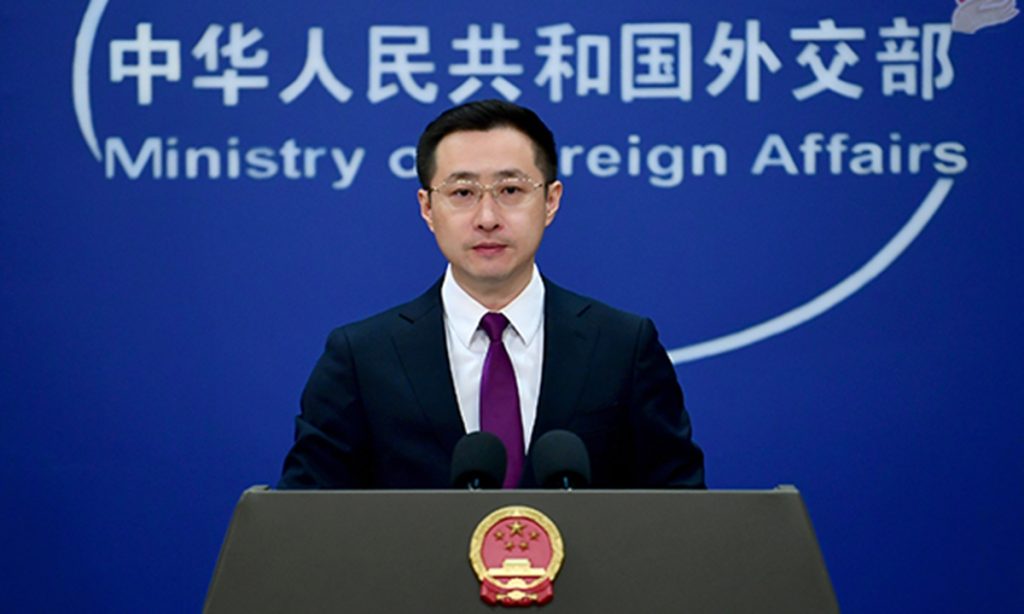Chinese FM urges relevant department in UK to stop groundless accusations against Chinese firms in response to concerns over Chinese drones

The Chinese Foreign Ministry on Thursday urged the UK's relevant department to stop turning trade into political and security issues, stop groundlessly accusing and going after Chinese high-tech companies, and make more effort that is conducive to the sound and steady development of China-UK relations.
Foreign Ministry spokesperson Lin Jian made the remarks at a regular press conference when asked to comment on the reported concern raised by the UK government over British companies using Chinese manufactured drones to take high-quality images of important infrastructure in the UK.
The Chinese government has never asked and will never ask any company to collect or store data against laws. The Chinese side firmly opposes the relevant side's groundless suspicion and vilification against China which lack a factual basis, said Lin.
The remarks follow UK government officials have reportedly raised fresh concerns over the use of Chinese-made drones at critical national infrastructure sites, warning that such practices may run counter to guidance from the country's security services, Bloomberg reported on Wednesday.
Some Chinese experts responded by noting that Chinese drones such as DJI drones are widely used around the world for civilian uses and argued that the security concerns are largely political, lacking concrete evidence of immediate threats. The timing of the accusations, along with renewed attention on British Steel, comes as the two countries are working to improve ties, highlighting internal political discord and contradictions in the UK's approach to China, experts said.
Bloomberg reported that the role of Chinese companies and equipment in critical national infrastructure has been in focus in the UK. It mentioned that National Grid Plc, which operates the nation's electricity and gas networks, uses drones made by Shenzhen-based DJI to take videos, photographs and thermal images of its electricity substations. DJI drones have also been used to survey the construction of Electricite de France SA's Hinkley Point C nuclear power plant, to inspect solar farms, and by Thames Water to monitor reservoirs and the water supply.
The report claimed that deployment of the drones comes despite a warning in 2023 by the UK's National Protective Security Authority, part of the domestic security service MI5, that British organizations managing sensitive sites should be wary of using drones "manufactured in countries with coercive data sharing practices," a reference to China.
National Grid Plc and Thames Water told Bloomberg they adhere to government guidance and take security seriously.
DJI has not answered the inquiry by the Global Times on the matter by the press time.
The report followed recent rhetoric by some British politicians who have been hyping issues surrounding British Steel, the last UK facility capable of producing steel from iron ore, involving a Chinese private company, while calling for a ban on Chinese firms in critical industries.
The renewed focus on drone security also emerged just as Britain's business minister Jonathan Reynolds prepares to visit China later this year to boost trade and investment, according to The Guardian.
Experts said the timing of the report reflects a contradiction within the UK's current political climate. "While the Starmer administration is taking a relatively more pragmatic approach and looking to expand trade with China to cushion global trade turbulence caused by the US, internal discord remains — particularly around national security concerns," Yu Wenjie, Director of the Institute of British and Commonwealth Studies at Nanjing University, told the Global Times on Thursday.
Some in the UK often approach the UK's engagement with China through an ideological lens, with certain media outlets and politicians frequently making unfounded accusations even in the context of normal bilateral economic exchanges or the legitimate operations of Chinese private enterprises in the country, Zhao Junjie, a senior research fellow at the Institute of European Studies at the Chinese Academy of Social Sciences, told the Global Times on Thursday.
Zhao described the UK's stance toward China as a "contradictory composite." On the one hand, the UK seeks cooperation with China in areas such as finance, technology, and the green economy; on the other, some media and politicians continue to view China with entrenched hostility and a Cold War mentality. "They want the benefits of engagement with China, while also trying to guard against and criticize it—this results in policies that are often logically inconsistent," he said.
It is important for some UK politicians and media to honor the broad picture of deepening China-UK ties, and remind them not to let their behavior undermine the overall momentum of improving bilateral ties, Zhao said.